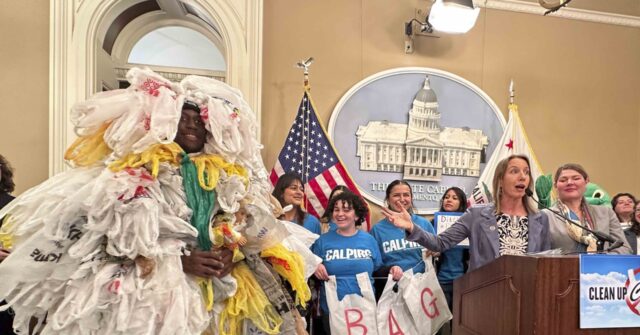California’s 2014 ban on thin plastic grocery bags caused more plastic bag waste, not less, according to the Wall Street Journal.
Breitbart News covered the fight over the plastic bag ban — the first by any state in the nation — in 2014, noting that the ban was a regressive tax on consumers that would benefit large grocery chains, who could charge ten cents per bag for heavier, government-approved plastic bags that were, in theory, more reusable than the thinner ones.
Ten years later, the amount of plastic bag waste per California resident has risen by almost 50%, the Journal notes:
Specifically, the weight of plastic bag waste per capita increased after the original ban was passed. Even a study called “Plastic Bag Bans Work,” done by environmental and public interest groups, features a table showing that the amount of plastic bags thrown away per 1,000 people in California rose from 4.08 tons in 2014 to 5.89 tons in 2021. The report blames this on a “loophole” in the law.
When the ban on thin, single-use plastic bags went into effect, shoppers were left with a choice between paper bags or heavier, multiuse plastic bags. But many people apparently didn’t reuse these thicker plastic bags as often as politicians imagined that they would, leading to the overall increase in plastic garbage. As a fix, the state Assembly and Senate are moving now to crack down on these carryout bags, which have been permitted for the past 10 years.
Yet the legislation doesn’t cover sturdy, reusable bags made of non-woven polypropylene (NWPP), which feels like canvas but is made of plastic. Grocers don’t mind if the government bans other bags if they can sell these at about a dollar or two a pop. But as New Jersey found out after it passed its own plastic bag ban, NWPP ends up in the trash, too, and plastic consumption went up.
Vice President Kamala Harris — who is from California — has supported similar bans, including a ban on plastic straws, which has no proven environmental value and has produced paper straws that consumers dislike.
California takes pride in being the first state to adopt “progressive” policies, in the hope that other states will follow. But there is little attention paid to whether these policies actually work, or whether — as in this case — they achieve the opposite.
Likewise with housing subsidies. Harris has proposed supporting first-time home buyers with subsidies of up to $25,000 for down payments. But as the Journal notes, separately: “No state has spent more on housing than her native California, yet it has the nation’s highest home prices. As a result of sundry regulations, it costs more than $1 million to build an “affordable” housing unit in the Golden State.”
Joel B. Pollak is Senior Editor-at-Large at Breitbart News and the host of Breitbart News Sunday on Sirius XM Patriot on Sunday evenings from 7 p.m. to 10 p.m. ET (4 p.m. to 7 p.m. PT). He is the author of “”The Agenda: What Trump Should Do in His First 100 Days,” available for pre-order on Amazon. He is also the author of “The Trumpian Virtues: The Lessons and Legacy of Donald Trump’s Presidency,” now available on Audible. He is a winner of the 2018 Robert Novak Journalism Alumni Fellowship. Follow him on Twitter at @joelpollak.
